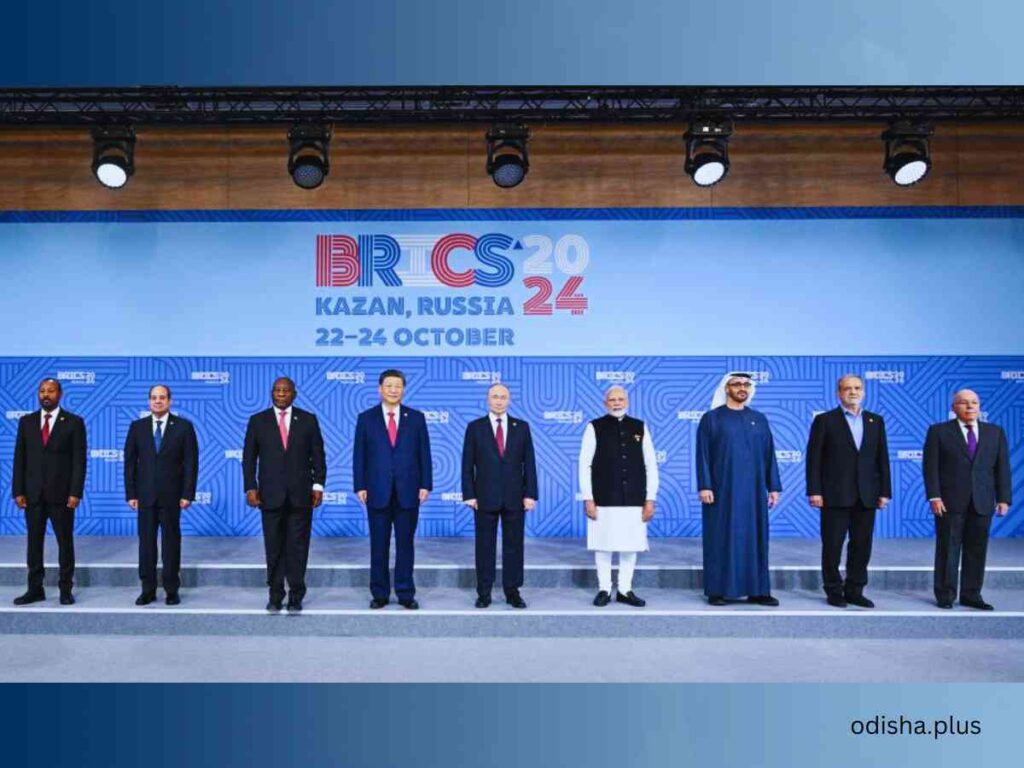Analysts are observing the developments in the conference as a new direction in an emerging world order
Suresh Chandra Sarangi

The euphoric feeling prevailing among the members of the BRICS countries has created a feel-good factor. Analysts are observing the developments in the conference as a new direction in an emerging world order. There seems to be a crucial discussion to establish a new world economic order for consideration that may result in de-dollarisation and write a new chapter in international politics. The decision of the government of India and the People’s Republic of China to disengage on the border seems to be a valuable thaw in geopolitical development just after the Kazan conference.
It appears like a reversal of the trend of belligerence between the two countries and maybe China has understood India’s emerging world position for which hostilities seem to have been given a goodbye. Or, the Chinese disengagement at the border is a development, being after the effects of the Kazan declaration or a counter to Quad Summit, is a very perplexing development. It is said, by the think tank, that the spirit of a new Bandung is discovered in the Kazan declaration, which promises a strong, powerful multipolar order.
Dollar in Danger
Or, is it a new Cold War in offing? One thing is sure from a bipolar order after World War II and unipolar after the collapse of the USSR, it is now converging into a multipolar world. Economist and Nobel laureate, Paul Krugman has doubts about the emergence of a new world order. However, economist like Mohammad El Erian observes that this is a significant development and may be a step forward to dislodging the seminal position of the world’s global reserve currency, the Dollar.
Reading between the lines and after analyzing the developments one understands, as economists expect that the BRICS may be bringing about an overhauling of the financial architecture of the world, in creating a new BRICS currency that can destabilize the preeminent position of the US and China. World geopolitics, it appears, till the Euphoria is not challenged and disturbed is gearing for the emergence of a new world economic order, that may unnerve the US and the Western World.
First of all, let us try to understand the Kazan Declaration. It is being interpreted that the Kazan declaration has much to do with Russia’s foreign policy, on the backdrop of the war with Ukraine. The reflection of current global governance, the emergence of a multipolar world and a reformist economy fostering a spirit of equal partners in world trade. It covers a vast region like Russia, Africa, the Middle East, East Asia & Asia pacific, Latin America & Caribbean countries and South Asia in particular. The declaration is mammoth, signifying one thing there is open interaction and maybe the participating nations are converging in more matters year after year.
The addition of new countries based on varied geography representing the multicultural dimension highlights one thing there is an expansion in the structure as well as function of the BRICS. It is culturally diverse, being ruled not in different geographies but having diametrically opposite political cultures that are trying to come together, with membership increasing each year since its inception. It appears like the new platform has engaged the attention of the world, which is diversified, unique and promising multilateral cooperation.
BRICS Alternative
In their efforts to innovate and shape up the future global governance, find solutions to pressing global problems and address the concerns of the global economy, trade and with an ultimate aim to partner for progress without being bullied by any superpower’s threat. The BRICS declaration is an important step towards fighting terrorism across the globe, attending to the serious concerns of the global climate change imperative and other things that are of immediate concern. The declaration throws light on the growth and development of a passion for exploiting the opportunities, mostly, in reforms in institutional mechanisms, and creating a distinct BRICS Signature alternative.
This shall be both structural as well as functional. The document firmly reasserts the reasonableness of the existence of WTO and liberalization of trade against British nations. The declaration unequivocally supports a new theme of reorganizing multilateral institutions and doing away with the practice of sanctions, which sometimes has turned out to be unethical, unilateral coercive actions.
This, perhaps, echoes the US sanctions against Russia just after Russian aggression and the US sanctions on the trade front, seizing its resources and banning the use of the SWIFT mechanism. This is a phenomenal step, a change in thinking pattern, as the contention of the declaration speaks that any unilateral sanction is an anathema and is detrimental to development.
The declaration, with its pious ambition, tries to rechristen the global conflicts and the conflicts undergoing between the member nations. It also says that there should be a peaceful resolution of the conflicts, within the framework of the UN General Assembly and Security Council. The declaration could not have a common voice on the ongoings in Palestine, Gaza and territorial integrity of Syria. The declaration is not very emphatic on Ukrainian rights but stresses regional conflicts.
Viable Force
The declaration is suggestive of the fact that BRICS in its enlarged format is prepared to create new stories in world history by attacking the old myth of global governance. This also takes care of the global South and tries to maintain the status of bringing cooperation, with a frontal attack on US global hegemony. Kazan’s declaration, in a way, is a signal that BRICS can be a sound and viable force in international politics global economy and trade.
BRICS countries represent 37% of the global economy and that is sizable. Navigating through the rough waters of geopolitical interests and conflicts may be a tall order and a huge task for the participants to achieve the goals of a common shared agenda. With China and India, two emerging powers having strong positions on the chessboard of international politics, it may be a difficult job to bring them together into a common understanding. Similarly, Russia’s war with Ukraine is a contentious issue. The attack of Israel with missiles and counterattack by Israel is a riddle, considering Iran’s oil wealth.
Differing political systems, economic agendas and pursuit of one’s national interest appear to be standing in the way of forging solidarity and understanding, going ahead. Mostly, it appears aspirational also and as the emerging world politics is constantly changing, it may be difficult to reconcile those conflicting interests. China’s ambition and aggressive posture toward Taiwan is a thorn in maintaining peaceful coexistence in South Asia.
Contented Putin
Putin appeared to be very content with the outcome of this power shift. Are the US-led global institutions under a challenge? Critics say it is a new economics for a new world. The current system, so far as global power politics is concerned, is unequal and the member nation feels that the new model incorporates principles of diversity and cooperation. This appears to be a power shift. The optimists think that BRICS is at least desirous of a more just, equitable and sustainable world.
Economically, it is an effort to unify the world, reshape the global order and a welcome departure from the rule-based global order. All said and done, the Kazan declaration should not be treated as mere platitudes, it may be treated as another new initiative to make the balance of power theory more realistic and give Detente a chance.
(The writer is a former General Manager of Bank of India and currently a visiting professor at KIIT School of Management. Views expressed are personal)






















